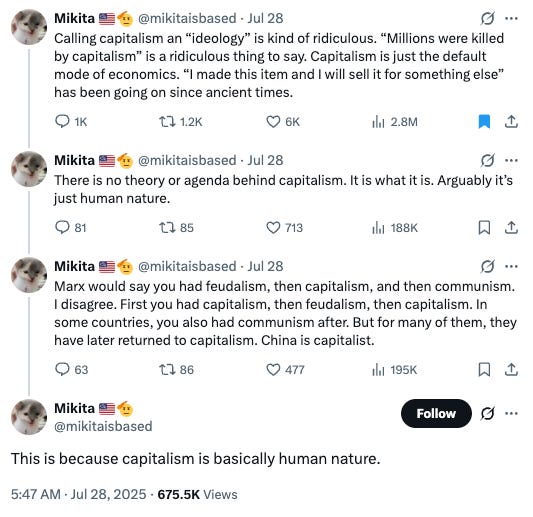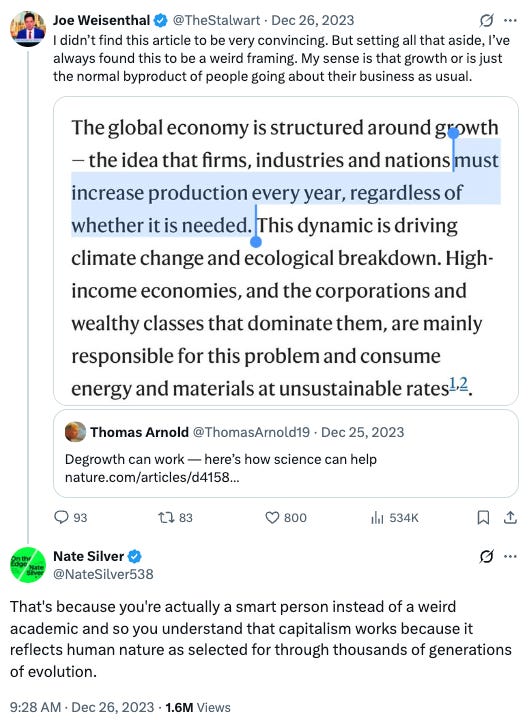Natural Capitalism is a Fallacy
So why do so many capitalists believe it?

The hardest challenge of advocating for socialism isn’t that people misunderstand socialism — it’s that they misunderstand capitalism. Many of capitalism’s most ardent defenders, both in the general public and in the political pundit class (the commentariat, if you will), fundamentally do not understand the socio-economic system they advocate for. Take, for example, this recent semi-viral post on Twitter/X.
As this person puts it, ‘Capitalism is the default mode of economics,’ which ‘has been going on since ancient times.’ I call this misbelief the Natural Capitalism Fallacy — the incorrect assumption that capitalism is an organic occurrence, the inevitable result of humanity’s evolutionary path upon Earth. To the Natural Capitalists, questioning capitalism’s supremacy is akin to asking if humans should be subservient to dogs; it’s a nonsensical position that flies in the face of nature and logic. However, Natural Capitalists are dead wrong.
Once upon a time, a caveman tried to trade a sharp stick for a companion’s fish. The woodsman wanted the fisherman’s catch, but the fisherman didn’t think his meal was equal to the value of the labor that went into finding the stick and whittling it into a point. The fisherman rejected the offer, but the woodsman was hungry, so he countered: two sharp sticks for the trout, which was looking more savory by the minute. Feeling the value of the exchange was now in his favor, the fisherman accepted. Both parties took their newly acquired property and walked away happy. When mundane interactions such as this one are repeated continuously across society (even among our theorized, primitive ancestors), it creates an economy — the system in which goods and services are distributed. Every commodity is assigned a relative value based on its supply and demand. For our ancestral hunter-gatherers, an animal skin might be worth two fish in the summer, but four in the winter. Natural Capitalists recognize this self-regulating, decentralized coordinating mechanism as ‘capitalism.’ To them, this ‘capitalist’ process has been in place since ‘ancient times’ and therefore should remain undisturbed by external actors, such as the regulatory state or labor unions. There’s only one problem with this theory: this isn’t capitalism.
Like many other Natural Capitalists, the above commenter mistakes capitalism for a market. Markets, the voluntary exchange of goods and services between private parties, have existed in every recorded human society, no matter its mode of production (capitalism, socialism, feudalism, etc). When our hypothetical cave-dwelling ancestors traded primitive necessities, that was a market. When Romans bought and sold slaves with gold and silver, that was a market. And when we modern humans shop for a car, go to a movie, or financially support our favorite Substack (I couldn’t help myself), we are engaging with a market. While the last example is a market interaction within a capitalist society, capitalism is not necessary for a market to exist. That’s because a market is the method of distribution — the process by which people acquire goods — while capitalism is the method of production — how the goods are made.
What makes America’s capitalist system capitalist isn’t the presence of markets, but the private ownership of businesses, factories, and everything else used to make things. To get technical, capitalism is the private ownership of the means of production. The people who own America’s productive forces are called capitalists, a privileged class that uses the power afforded by their ownership of the productive forces to tilt society towards their favor. Unlike in primitive or feudal societies, in which commodities were often sold by the person who made them (such as our aforementioned fisherman), capitalism produces goods through exploitation. Exploitation may sound like a harsh word, but I use it in a literal, judgement-neutral sense. Capitalists hire workers to make things by using their capital. Then, the capitalists sell those goods to customers and pay the workers less than the sale value of what they produced. The difference between what the capitalist sells the good for and what it cost to make is called profit. In capitalism, the capitalists make use of the working class, who do not own capital and therefore must sell their labor to survive, to create profit — a dictionary definition of exploitation.
Once produced by capitalism, goods and services can be distributed through a market or through central planning, when a centralized entity (usually the government) determines how and where the product is used. Although often associated with socialism, capitalist economies also centrally plan. In the United States, electricity, the most essential commodity in modern life, is produced by capitalist companies and then distributed to consumers through government-planned electrical grids. Though socialists frequently call for greater social ownership of the means of production, central planning is not a requirement of socialism. For example, Norwegian oil is owned by the state. Once produced and sold, revenue funds Norway’s social wealth fund. a $1.8 trillion endowment that is highly-coveted by foreign investors.1 Yet that oil is sold on the global capitalist market, often to capitalist electric companies.2 In a very ironic market exchange, capitalist electric countries around the world buy Norway’s socialist-produced gas, then sell it to customers through centrally-planned (but still capitalist) energy grids. As a socialist, I believe those capitalist energy companies are unnecessary middlemen, who increase costs by extracting value from a system. Energy production should be optimized by cutting out this layer of fat through socialization, but that’s a discussion for a future article.
Unfortunately, the Natural Capitalism Fallacy isn’t limited to micro conservative influencers. Nate Silver, who is often lauded for his political insight, subscribes to the Natural Capitalism Fallacy. Here he states capitalism has been present for ‘thousands of generations of evolution.’ Capitalism began during the 14th century enclosure of the British common lands, which forced once self-sustaining farmers to sell their labor to landlords, so saying it’s ‘been around for thousands of generations’ is preposterous.
The best showcase of the prevalence of the Natural Capitalism Fallacy came during a June 2016 episode of Real Time with Bill Maher. Maher, who has never been accused of having a deep understanding of world events, compared capitalism to a river, which flows naturally but needed to be dammed (regulated) to ensure it was working productively. Recognizing Maher’s flawed thinking, Rage Against The Machine guitarist Tom Morello rightfully corrects him, saying a river is natural while capitalism is a human creation.
Panelist Ana Marie Cox (whose work I’m quite fond of) jumps in to say ‘Well, people have been buying things since before they were money’ — an exact endorsement of the Natural Capitalism Fallacy that a market ('buying things since before there was money’) is capitalism. As always, I don’t blame average people for not understanding the particulars of capitalism. After all, I’m sure they had a public education like mine that told them capitalism is The Free Market™️ and communism is Central Planning — which is bad, except when America does it. However, there’s no excuse for the political pundits who argue for capitalism on their HBO politics talk show (often quite condescendingly, I might add) to spout misinformation that could be clarified by reading capitalism’s Wikipedia page.
I’m unsure why so many who are eager to make a name for themselves in the political field will defend an ideology they can’t even define, never mind explain. A significant portion of it is beneficial groupthink, of course. If you want to be taken seriously in Washington or any of its media satellites, you must say that capitalism is not only good, but a fundamental of human nature, as integral and natural as the air bringing oxygen into our lungs. In such circles, adopting the Natural Capitalist view requires no inspection, as it’s what everyone is saying, and repeating it will be rewarding. While I don’t mean to discard the zealotry of the American elite, I can’t help but feel the fallacy of Natural Capitalism is simply the easiest road to take. It is quite hard, especially in current circumstances, to defend the private ownership of the means of production, the defining characteristic of capitalism, on its merits. Making an argument for why Walmart should remain in the hands of the Walton children, who neither founded the company nor have worked a day in their lives, as opposed to being collectively owned by either its impoverished workforce or the government that regulates it, is a challenging task. Whether consciously or subconsciously, many pro-capitalist voices turn to the falsehood that capitalism is something natural, and deviation from it is as silly as saying humanity should abandon bipedalism and return to running around on all fours.
As markets arose alongside the first proto-humans, it’s fair to say that markets are conducive to human nature. When I was a kid, I traded Pokemon cards with my friends. We had no idea what capitalism or a market was, we were just acting on instinct: I want a Blastoise, and I’m willing to trade two Raichus for it. That was an intuitive interaction, which remains present throughout a person’s life. However, capitalism, which involves the private ownership of the means of production, is not natural. It has been designed, enshrined, and protected by a class of people who benefit from it. Capitalism is an artificial creation no more natural than a highway. This must always be centered when debating the merits of whether humanity should limit itself to the current capitalist system or explore post-capitalist advancements. The fact that those who favor the former either fail to, or choose not to defend their argument on the merits does not bode well for their preference.
If you enjoyed this article, please click the ❤️ and subscribe to support my work. If you’re a returning reader, consider upgrading to unlock exclusive bonus content. It only costs one cup-of-coffee a month (less if you subscribe annually), and ensures I can keep creating content that disputes false narratives such as this. Thanks in advance!
In Solidarity — Joe
https://fortune.com/europe/2025/07/30/how-sparsely-populated-norway-amassed-1-8-trillion-sovereign-wealth-fund/
https://www.norskpetroleum.no/en/production-and-exports/exports-of-oil-and-gas/




Good to distinguish between a market and a mode of production -- you're absolutely correct that the elision of the two erases the possibility of meaningful discourse on the term "capitalism." Regarding the caveman hypothetical, I think it's important to remember that the idea of money-based markets as descendants of direct barter itself is largely mythic. Erald Kolasi wrote this particularly insightful note on that element of the whole natural fallacy: https://substack.com/@technodynamics/note/c-125005177?utm_source=notes-share-action&r=47lytd
“It’s a dog eat dog world” is such a stupid statement because it isn’t. A dog will only eat another dog if things have gone very badly wrong for both dogs. The reality is that we live in a “dog support dog” or “dog sometimes prioritise the needs of the community ahead of themselves” world. Dogs are pack animals, successful because they cooperate, just like humans.